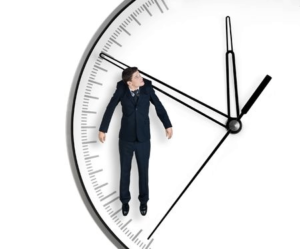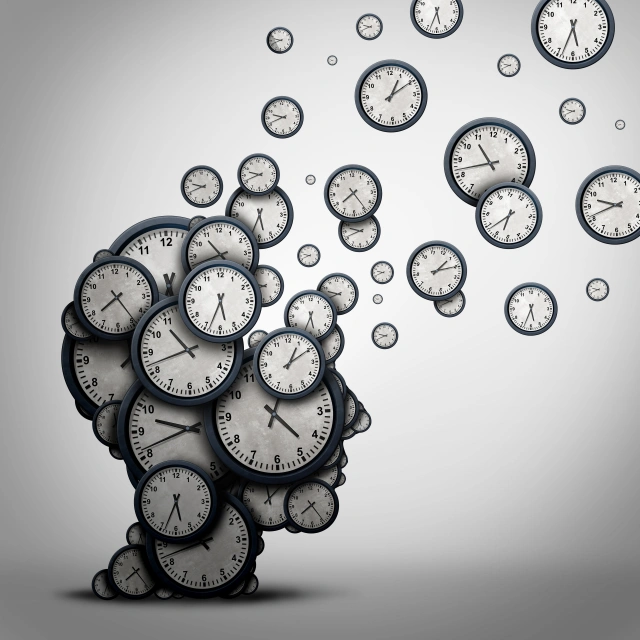Do you find yourself constantly checking the time? Do you feel like you can’t relax until you know what time it is? If so, then you may be struggling with time OCD. This type of OCD is characterized by an obsession with the clock and a need to constantly track the time. While this may seem like a minor problem, it can actually be quite disruptive and interfere with your daily life. In this blog post, we will discuss how to stop obsessing over the clock and get on with your life!
Contents
Defining Time OCD

As suggestive as the name might be, time OCD is a type of Obsessive Compulsive Disorder (OCD) in which individuals are fixated on time. This can manifest in different ways, but the most common symptom is an obsession with checking the time. For sufferers of time OCD, it is not enough to know what time it is; they need to constantly check and recheck the clock to make sure that they have the correct time. This can become very disruptive and interfere with daily activities.
It is important to note that time OCD is not the same as simply being punctual or organized. While these may be related, they are not the same thing. Time OCD is a mental health disorder that can cause significant distress and interference in one’s life.
It may also be worth noting that time OCD is not to be confused with Chronophobia, which is the fear of time. Chronophobia is a separate condition that can often co-occur with time OCD. The distinction is important because Chronophobia is a phobia, while OCD is an anxiety disorder.
Types
While the signs of time OCD can be helpful in identifying the disorder, it’s also important to understand that there are different types of time-related OCD. This can be helpful in understanding your particular obsessions and how they might be affecting you. The three main types are:
- Past-Oriented Time OCD: This is focused on the past and is characterized by obsessions about things that have already happened. For example, you may obsessively replay past conversations in your head or ruminate on things you wish you had done differently.
- Present-Oriented Time OCD: This is focused on the present and is characterized by obsessions about what is happening right now. For example, you may be fixated on how long it’s taking to do a certain task or whether you’re wasting time.
- Future-Oriented Time OCD: This is focused on the future and is characterized by obsessions about what will happen next. For example, you may be obsessively worrying about an upcoming deadline or event.
All these subtypes may differ in terms of their focus, but they all share the common symptom of an obsession with time. If you find yourself fixated on the clock, it’s important to understand which type of time OCD you may be struggling with.
How Is It Different From Other Types Of Conditions?
OCD as a disorder has various types of manifestation. Some people might be obsessed with germs and cleanliness, while others might hoard things. The key feature of OCD is that the obsession interferes with daily life and causes distress. In the case of time OCD, individuals are fixated on time to the point where it disrupts their daily routine.
Time OCD can also be distinguished from other types of OCD by its relationship to anxiety. For many people with OCD, obsessions are actually a way to reduce anxiety. For example, someone might obsessively wash their hands because they are afraid of germs. In contrast, time OCD is often associated with high levels of anxiety. The constant checking of the clock is not done to reduce anxiety, but rather to increase it. This is one of the key ways that time OCD differs from other types of OCD.
Lastly, it may also be helpful to understand how time OCD is different from other types of OCD. Time OCD is often characterized by a fear of wasting time, feeling like there’s not enough time, or feeling like you have to do things in a certain order or way. Other types of OCD may focus on fears of contamination, harm, or perfectionism. If you can identify that your obsessions are primarily related to time, this may help you better target your treatment.
Signs
It can be tricky to really understand and observe the ways in which time OCD affects you. This is in part because it can be difficult to track the time you spend thinking about time! However, there are some ways that time OCD may manifest as. Some examples and instances include things such as:

- Checking the clock more often than feels necessary. This can include checking your phone, a watch, the oven timer, or any other type of clock.
- Finding that you’re always running late or feeling like there’s not enough time. This can lead to a lot of anxiety and stress.
- Having a hard time focusing on tasks because you are thinking about time or are worried about how long it will take.
- Planning and organizing your day around specific time limits. This may include setting alarms for everything, making to-do lists with estimated time frames, or scheduling every minute of your day.
- Fixating on “lucky” or “unlucky” times such as 13:13, 666, or 11:11.
- Avoiding time-related words, numbers, or symbols such as clocks, hourglasses, or watches because they are triggering.
- Avoiding activities or places because they are associated with a bad experience or a fear of being late.
- Feeling like you have to do things in a certain order or at a certain time or it will be “wrong.”
- Constantly feeling like you need to hurry up or speed up.
- Becoming overwhelmed by time pressure and feeling like everything is a race against the clock.
Do any of these sound familiar? Time OCD can be a very debilitating condition, but there is hope for recovery. With the right treatment, many people with OCD are able to manage their symptoms and live relatively normal lives.
Causes
There is no one definitive cause of time OCD. It is a very complex condition with a variety of potential causes. Some possible contributing factors include:

- Biological factors: There is some evidence to suggest that OCD may be partly due to genetic factors. This means that if you have a family member with OCD, you may be more likely to develop the condition yourself.
- Neurological factors: There is also evidence to suggest that time OCD may be related to certain areas of the brain. For example, one study found that people with time OCD tend to have higher levels of activity in the caudate nucleus. This area of the brain is thought to be involved in movement and motivation.
- Psychological factors: There are a number of psychological factors that may play a role in time OCD. For example, people with time OCD often have difficulty dealing with uncertainty. They may also have perfectionist tendencies or a need for control.
- Environmental factors: There are also a number of environmental factors that may contribute to time OCD. For example, if you experienced a lot of stress or trauma in your life, this may increase your risk of developing the condition. For example, if you faced a very traumatic and disturbing event at a very specific time, say 11:11, this may become a trigger for your OCD. You may also develop resentment or disturbance against specific times if you have had bad experiences associated with them in the past.
These are all the possible causes of Time OCD. It is important to note that everyone is different and there is no one single cause of OCD. It is likely that a combination of these factors plays a role in the development of the disorder.
Consequences
While the signs and actions relating to time OCD may seem harmless, the condition can actually have a very profound and negative impact on your life.
- Anxiety and stress: One of the most common consequences of time OCD is anxiety and stress. This is because constantly thinking about time can be very overwhelming and can make it difficult to focus on anything else.
- Relationship problems: Time OCD can also lead to problems in your personal relationships. This is because the condition can make you seem obsessive, inflexible, or even crazy.
- Work problems: Time OCD can also interfere with your work life. This is because the condition can make it difficult to focus on tasks and meet deadlines.
- Financial problems: Time OCD can also lead to financial problems. This is because the condition can make it difficult to manage your time and resources.
- Other mental disorders: Extremities of these signs can also make an individual vulnerable to other mental disorders such as depression, anxiety disorders, schizophrenia, and substance abuse.
- Emotional distress: Time OCD can also cause a great deal of emotional distress. This is because the condition can be very isolating and can make you feel like you are the only one who is struggling. It can make an individual feel worthless, helpless, and hopeless.
All these consequences can result in a very negative impact on your quality of life. If you are struggling with time OCD, it is important to seek help.
Tips To Manage
If you think you may have time OCD, it is important to seek professional help. Time OCD is a very treatable condition, but it often requires specialized treatment. Treatment typically includes some combination of medication, therapy, and self-help.
Medication
There are a number of different medications that can be used to treat OCD. The most common type of medication include:
- Selective serotonin reuptake inhibitors (SSRIs): SSRIs are the most commonly prescribed type of medication for OCD. They work by increasing levels of serotonin in the brain.
- Serotonin and norepinephrine reuptake inhibitors (SNRIs): SNRIs are another type of medication that can be used to treat OCD. They work by increasing levels of both serotonin and norepinephrine in the brain.
- Tricyclic antidepressants (TCAs): TCAs are another type of medication that can be used to treat OCD. They work by increasing levels of norepinephrine in the brain.
- Antipsychotic medications: Antipsychotic medications can be used to treat OCD in some cases. They work by reducing levels of dopamine in the brain.
Medications can be very effective in treating OCD, but they often take several weeks or even months to work. They may also have certain side effects and have different dosages and risks for different people. It is essential to work closely with a physician or mental health professional to get the most out of this approach.
Therapy
Therapy is another important treatment for OCD. There are a number of different types of therapy that can be used to treat the condition. The most common types of therapy are:
- Exposure and Response Prevention (ERP): ERP is a type of cognitive-behavioral therapy that involves exposing yourself to your triggers and then learning to resist the urge to respond. For example, if you have specific times or numbers that trigger your OCD, you may be asked to repeatedly expose yourself to those triggers in order to desensitize yourself to them.
- Cognitive-behavioral therapy (CBT): CBT is a type of therapy that focuses on changing the way you think about your triggers. For example, if you have OCD, you may be taught how to challenge and reframe your thoughts about your triggers.
- Acceptance and Commitment Therapy (ACT): ACT is a type of therapy that focuses on accepting your thoughts and feelings about your triggers. For example, if you have OCD, you may be taught how to accept your thoughts without trying to change them.
All these techniques differ in their approach, but they all share the goal of helping you to manage your OCD.
Self-help
There are also a number of things you can do on your own to manage your symptoms and make the most out of treatment. Some self-help tips that can be helpful for people with OCD include:

- Keeping a journal: Keeping a journal can be a great way to track your thoughts and progress in treatment. For instance, you may want to keep track of your exposure and response prevention progress.
- Practicing relaxation techniques: Relaxation techniques can be helpful in managing anxiety and stress. Some relaxation techniques that can be helpful for people with OCD include yoga, meditation, and deep breathing exercises.
- Understanding and avoiding triggers: Identifying and avoiding your triggers can be a helpful way to manage your symptoms. This means that you will need to be aware of what your triggers are and make a conscious effort to avoid them.
- Confronting your fears: Confronting your fears can be a difficult but important part of treatment. This means that you will need to face your triggers head-on in order to learn how to manage them.
- Repeating affirmations: Time can be a very tricky subject for people with OCD. As a result, it can be helpful to repeat affirmations such as “I am in control of my time” or “Time is not controlling me.” This may contribute to a more positive outlook and help you to feel more in control.
- Finding other outlets: When you feel the urge to engage in OCD behaviors, it can be helpful to find other outlets for your energy. For instance, you may want to go for a walk, read a book, or talk to a friend.
- Seeking support: There are a number of different support groups available for people with OCD. These groups can provide you with valuable information and support. You may also seek aid and guidance from family, friends, or clergy.
OCD can be a difficult condition to live with, but there are treatments available that can help. With the right type of treatment, you can learn to manage your symptoms and live a full and productive life. If you or someone you know is struggling with OCD, don’t hesitate to seek help. Remember, you are not alone. There is help available.
Conclusion
In conclusion of the above, time OCD is a rather understood yet very real thing that can significantly interfere with one’s daily routine if not kept in check. If you think you might have time OCD, don’t hesitate to seek professional help. With the right treatment, many people with time OCD are able to manage their symptoms and live relatively normal lives.
If you or someone you know is looking for OCD treatment, please contact Therapy Mantra. We have a team of highly qualified mental health professionals who can help you develop a treatment plan that is right for you. Our services are affordable and effective and available to people all across the world. Do visit our website to book a session or download our free OCD treatment app on Android or iOS for more information.


